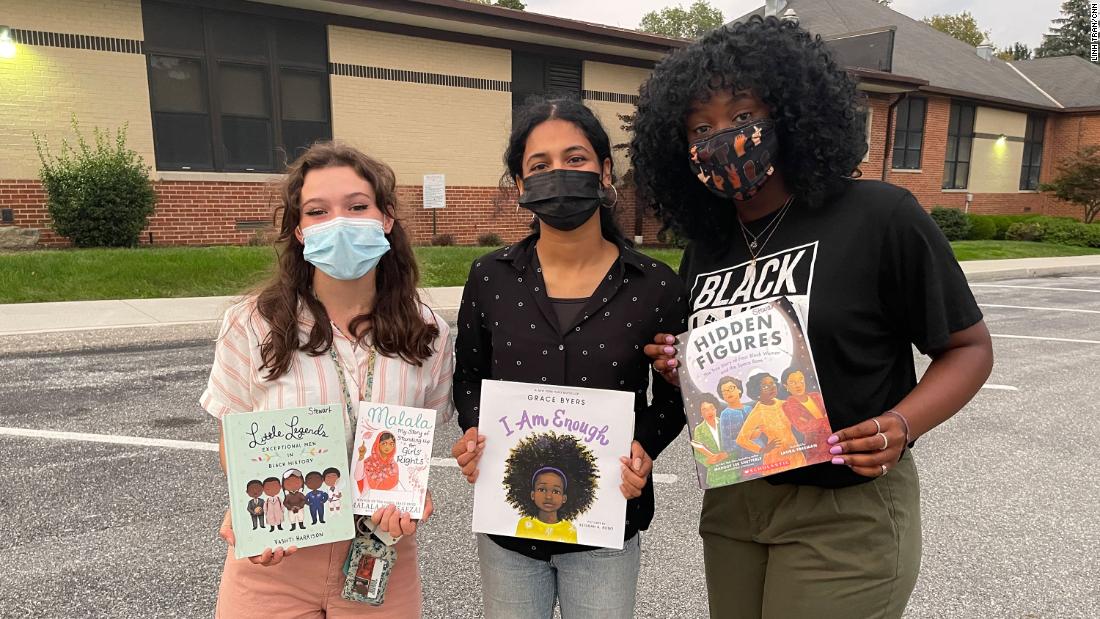Why did this school ban books on racism?
3:34
Editor's Note:
Jay Parini, poet and novelist, teaches at Middlebury College.
His most recent book is "Borges and me", a memoir of his travels through the Scottish highlands with Argentine writer Jorge Luis Borges in 1971. The opinions expressed in this commentary are those of the author.
(CNN) -
Banning books is a bad American habit that we must break. The ban comes from all sides of the political spectrum, left and right, and the practice is often dangerous. Freedom of expression is fundamental to our democracy, the lifeblood of our educational system.
A few weeks ago, we read about the all-white school board in York, Pennsylvania, which last October unanimously voted to ban various educational resources that fall into the category of "anti-racism."
The teachers received the list of articles, books and videos, according to the Allentown newspaper, the Morning Call.
It included, as reported by CNN, a children's book on Rosa Parks, a memoir by Malala Yousafzai, and a CNN show on race with the "Sesame Street" Muppets.
In September, students protested the measure outside Central York High School, and in a virtual meeting of the school board, students, parents and other community members debated the list.
School officials say the materials are not banned, but "frozen" while the council examines them.
So far, this review has lasted nearly a year, as CNN has reported.
"Schools are not the place to shape politics or identity," declared a mother who supports the ban.
You are wrong.
Schools are precisely the place where politics and identity are formed, and therefore students need the widest range of materials to learn, including those that offend parent censors on the left and right.
Government of Mexico will modify textbooks for school books 3:37
This summer, Texas authorities tried to ban a book titled "Forget the Alamo," a revisionist history of the 1836 battle at Fort San Antonio.
In July, Lt. Governor Dan Patrick canceled a promotional event for the book at the Bullock State Museum of History.
According to The Texas Tribune, about 300 people were scheduled to attend.
The opportunity to finally hear the truth about one of the most revered - and unsubstantiated - legends in Texas history was taken away from them.
"Forget the Alamo," by historians Bryan Burrough, Chris Tomlinson and Jason Stanford, is an important corrective.
Like most Baby Boomers, I grew up believing in Disney's fake version of the Battle of the Alamo, as told through the eyes of Davy Crockett.
They made us believe that the battle was heroic.
Students fight back against a book ban that has divided the Pennsylvania community
It was not.
The real story, as we learn in the book, "is that of white American immigrants in Texas who rebel in large part over Mexican attempts to end slavery."
Far from heroically fighting for a noble cause, they fought to defend the most heinous of practices.
Mexico abolished slavery in 1829, long before its northern neighbor.
Most Americans are unaware of this story.
If we don't know what really happened, we have no way of understanding the past.
What we believe to be history is actually a jingoistic and partisan fantasy.
Dan Patrick explained in a tweet why he couldn't tolerate "Forget The Alamo": "This factless rewrite of TX history has no place @BullockMuseum."
Chris Tomlinson responded on Twitter: "Lt. Governor Dan Patrick takes credit for oppressing free speech and policing thought in Texas," he wrote.
"@BullockMuseum proves that it is a propaganda outlet. As for its non-factual comment, well, a dozen professional historians disagree."
For some years now, the American Library Association has published annual lists of the most "questioned" books. Most of them offend the self-righteous right, which cannot bear for students to learn about America's history of racial oppression and bigotry, or read positive portrayals of LGBTQ people, or witness the naked face of the poverty and prejudice.
A good Sherman Alexie book, "The Absolutely True Diary of a Part-Time Indian," was on the list of questioned books since it first appeared in 2007, largely because of its stark depiction of the lives of some Indians. American people. Khaled Hosseini's magical novel "The Kite Runner" has been banned because some parents seem to believe, quite ridiculously, that it promotes terrorism and Islam.
But the book ban is not just a product of right-wing bigotry.
Many liberal parents do not want their children to find the "N" word anywhere, not even in what is, in my opinion, the best American novel, "Huckleberry Finn" by Mark Twain.
And so they fight to ban a novel that eloquently and passionately attacks racism in 19th century America.
"Of Mice and Men," a major short novel by John Steinbeck, is also frequently questioned for its alleged racial stereotypes, even though it is a profound and humane book that raises questions that every teenager should consider.
They approve to remove statues of confederates in the Capitol 0:54
Judy Schachner's popular SkippyJon Jones books, a fantastic series about a flamboyant cat dressing up as a Chihuahua, have also been on the doom list. SkippyJon calls himself "bandito" and sometimes puts an "o" at the end of English words to make him sound Mexican. Some liberal book banners call this stereotypes, and since Schachner is not Mexican, they accuse her of "appropriating" things from a culture that is not her own.
The book ban is a bipartisan game, a point well made by Jonathan Zimmerman, a self-described liberal who wrote in The Dallas Morning News: "When conservatives try to ban a book, liberals take up arms. But when the threat comes from our own side, we often just sit idly by. "
Now, it is possible that there are books so outrageously prejudiced or depraved or provocative that young minds should not encounter them.
We can admit it, but I am wary of this slippery slope.
I suspect that the harmful effects of a book ban usually outweigh the dangers of allowing unsavory materials into classrooms on rare occasions.
And surely we must respect our teachers, giving them the freedom to find and use the materials they consider important.
If we can't trust them, the system is hopelessly broken.
I applaud the courageous and eloquent York students who have protested the book ban at their school, such as Central York High School senior Christina Ellis, who said at the virtual school board meeting in September "I don't think a moral compass allows you to ban books on equality and mutual love. "
Students like Ellis are absolutely right to oppose authoritarian attempts to control their worldview.
Hopefully they are precursors to the protests that are coming.
From coast to coast, the specter of book bans has become a serious problem that threatens the very fiber of democracy.
Of course, it is exacerbated by the terrible partisanship that promotes groupthink on both sides of the aisle.
But without the free play of ideas and the freedom to read and talk about anything (in class or in public forums) we become rigid, culturally ossified, and worse.
In other words, we are finished.
CensorshipBooks







/cloudfront-eu-central-1.images.arcpublishing.com/prisa/UN3R52DODVFLDBHY6QSGPVWNLU.jpg)